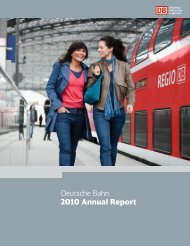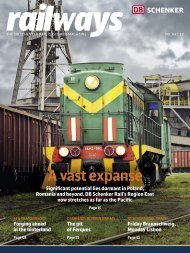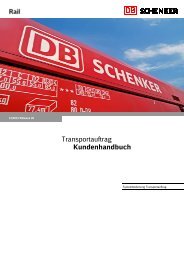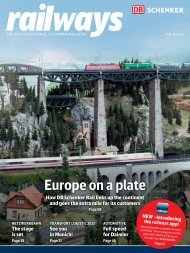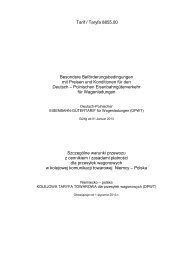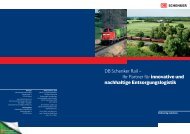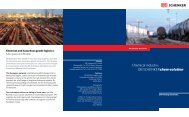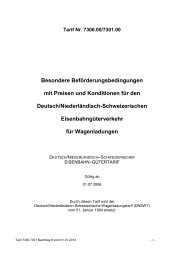PDF Download
PDF Download
PDF Download
Create successful ePaper yourself
Turn your PDF publications into a flip-book with our unique Google optimized e-Paper software.
Coverstory<br />
INTERVIEW<br />
A science in itself<br />
David Kerr, Commercial Director of DB Schenker Rail<br />
(UK) Ltd, explains the special requirements of fresh<br />
food logistics<br />
Who is the target group for the<br />
refrigerated transports from<br />
Spain to the UK?<br />
The service is intended for Spanish<br />
producers and British importers.<br />
Britain imports 90% of<br />
its fruit and 60% of its vegetable<br />
requirements. The major supermarket<br />
chains in Britain therefore<br />
need to import thousands of<br />
tonnes of fruit and vegetables<br />
from Spain, for instance oranges,<br />
lemons, lettuce and spinach.<br />
Without these deliveries<br />
from Spain, the fruit and veg<br />
counters in Britain would look<br />
relatively bare and some products<br />
would not be available at<br />
all at certain times.<br />
What role does the seasonal factor<br />
play in fresh food logistics?<br />
The seasonal factor is one of the<br />
central problems. Demand for<br />
produce from Spain is especially<br />
high in winter, when no fresh<br />
leafy vegetables are available in<br />
Northern Europe. Although<br />
oranges are imported from the<br />
Iberian peninsula all year round,<br />
demand simply explodes in the<br />
run-up to Christmas; in November<br />
alone, we transported over a<br />
million oranges from Spain to<br />
the UK every single week.<br />
It only makes sense for exporters<br />
and importers to set up<br />
their own transport capacities if<br />
the volumes remain comparatively<br />
constant. When the quantities<br />
fluctuate strongly from<br />
season to season, the risk of insufficient<br />
capacity utilisation is<br />
too high; accordingly, exporters<br />
and importers prefer to<br />
purchase short-term capacities<br />
– but that is an expensive option.<br />
Our refrigerated train offers<br />
customers maximum flexibility:<br />
they can book larger or smaller<br />
capacities at short notice or on a<br />
regular basis – and moreover at<br />
prices that at least match those<br />
of road haulage.<br />
What about the transport<br />
quality?<br />
A truck can take up to 60 hours<br />
to get from Valencia to London,<br />
and there is a very high risk of<br />
delay. Our trains arrive in London<br />
after 50 hours and we can<br />
guarantee punctuality and reliability,<br />
thanks to DB Schenker<br />
Rail‘s European network which<br />
enables us to handle the transport<br />
through Spain, France and<br />
Britain, without having to rely<br />
on other rail freight providers.<br />
And finally, a word about freshness:<br />
how do you ensure that the<br />
produce arrives in the best possible<br />
condition?<br />
That is a science in itself, because<br />
every single product requires<br />
an exact storage temperature.<br />
For oranges, lettuces and spinach,<br />
the optimum is around<br />
two degrees. Each individual<br />
container can have a different<br />
temperature depending on the<br />
product being carried and each<br />
has its own refrigeration plant.<br />
During the journey, the temperatures<br />
are monitored by a control<br />
centre in Warrington, which<br />
can also adjust them by satellite<br />
control as necessary.<br />
Friday,<br />
02:18h,<br />
at the Barking container terminal containers<br />
are being reloaded to trucks.<br />
Friday,<br />
05:30h,<br />
in a London supermarket: in time before the<br />
shops open, the good are delivered.<br />
14 | RAILWAYS



